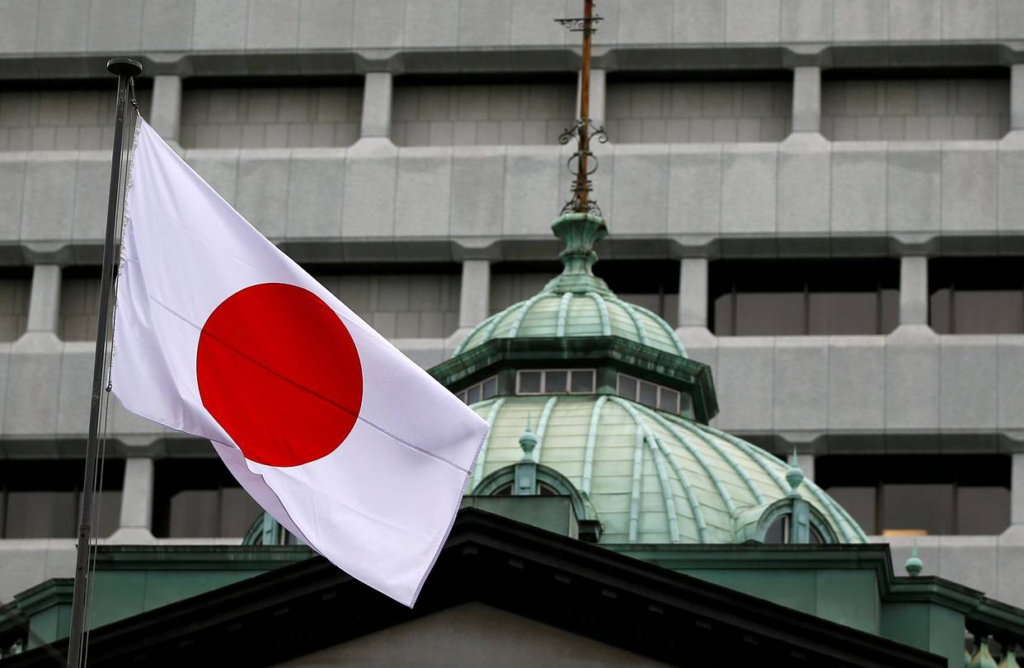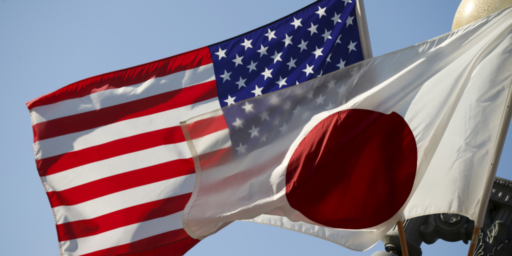Japan To Return To Traditional Name Order
At least in official government documents, Japan will return to the tradition Asian style of placing the surname before an individuals given name.

Japan is set to return to an ancient custom that puts it in line with the naming customs of nations such as China and Korea:
TOKYO — Japan will start using the traditional order for Japanese names in English in official documents, with family names first, a switch from the Westernized custom the country adopted more than a century ago, government officials said Friday.
The idea has been floated for years and but some ministers in Prime Minister Shinzo Abe’s ultra-conservative Cabinet recently started pushing for it again. The Cabinet agreed Friday to begin making the change with government documents, though no timeline was given for its start.
“It is important for all of us in the world to recognize language and cultural diversity as we live in an increasingly globalized society,” said Education Minister Masahiko Shibayama, a vocal supporter of the move. “It is significant to make a change per Japanese tradition and write family name before the first name.”
Chief Cabinet Secretary Yoshihide Suga said usage guidelines and other details still need to be discussed further. Suga said he looked forward to going by Suga Yoshihide, as he is known in Japan.
China and South Korea traditionally stick with the surname first order both at home and internationally. But Japan has chosen to be seen more as part of the West rather than Asia.
Japan adopted the first name before surname order for use in English about 150 years ago as a way to modernize and internationalize itself by imitating the Western style, according to the Agency for Cultural Affairs.
The Western-style name order has since been widely accepted and used in English journals, school textbooks and magazines. The style has also become standard on credit cards and at many private companies.
A government panel about 20 years ago recommended a return to the Japanese style but was largely ignored.
Those pushing for it in Abe’s government apparently hope to see the change spread, but it is unknown how the private sector will respond to the move.
Given that the westernized style of first name before surname has been part of Japanese culture for more than a century now, it will be interesting to see whether this carries over into the business world and, more importantly to wider Japanese culture. Perhaps more than any other nation, especially in the wake of the Second World War, Japan has become arguably the most westernized of the major East Asian nations. Returning to the old-style of putting the family name first could seem odd to younger Japanese people whose memory of Japan is limited to the westernized nation we know today.





This seems odd given both the 150-year legacy and the fact that it’s only a Western-facing custom. Still, there’s also something odd about having a completely different name abroad and at home.
@James Joyner:
I’ll be interested to see what policy the governments and media in the west will adopt with regard to Japanese Government officials. Will it be Prime Minister Shinzo Abe or Abe Shinzo?
In the case of Korea and China, the traditional custom in place in official documents is followed.
I don’t like this. Obviously they can pick whatever naming convention they like, and I’m not reading too much significance into this, but we might want to bear in mind that the US is 5000 miles from Japan and China is not. If we carry on this trade war much longer our Asian allies have got to be considering whether it’s better to get along with the behemoth next door or the one on the far side of the Pacific.
From the position of Japan or South Korea, I wonder whether long-term they would prefer to place their bets on an unstable US or on a thuggish Beijing, given that we seem determined to force that choice. Xi has such an interesting hand to play.
Of more immediate concern, Typhoon Faxai is forecast to hit Yokohama and Tokyo.
@michael reynolds:
I’m concerned too, but for a different reason. It’s an expression of the LDP’s irredentist views, same as they’re efforts to push increasingly revisionist takes of WWII where Japan was the victim rather than the aggressor.
Do you think there are some 100+ year old Japanese people who remember the good old days of surname first?
@Stormy Dragon:
Yeah, they’re trying to ignite some nationalism, rejecting you know, history. It calls to mind a story in the NYT today. It seems some visitors to plantations don’t like being reminded of slavery.
But that’s Abe playing politics. I wonder what the economic calculus looks like for Japan. Japan is both an extremely low fertility country and utterly xenophobic and racist, so they can’t just open their border and import workers. They’ve got a good 20 years to cope with their own baby boom generation and then what? Long term are they going to be willing to go on being our aircraft carrier?
Given that they write their names surname-first in Japanese (according to Wikipedia), this just seems normal. Maybe it’s the tip of a big wave of nationalism, or it means something about global alignments, but it really seems like just a touch of pride.
Ah, it’s for the English-language stuff in official documents. I was wondering about that, because in my ten years of working in Japan I never ran into any Japanese names with the surname last. Was working in Japanese, naturlich…..
(If we really wanted to do something useful, the US would go away from that bloody Month/Day/Year dating and use Day/Month/Year dating instead, like most other countries do. You can’t believe the amount of trouble that inconsistency has caused, especially when dealing with due dates. And we can’t even say we’re following the Brits, because the Brits use Day/Month/Year dates.)
@grumpy realist: Yes, it’s silly to insist on going our way when the rest of the world goes a different way, like Imperial units. Do we still have other industrial giants on our side or did Liberia finally give in and go metric? However, on dates, in personal and work applications, unless formats dictate otherwise, I default to year/month/date. Then dates sort so nicely in Word and file directories.
@grumpy realist:
I prefer Year/Month/Day for sorting purposes. Except when required by some official form, I usually write something like 2019.09.09. This makes it clear where the year is, and yet maintains our month/day order which is how we *usually* say things. (Yeah, it’s not universal, some people prefer saying it’s the 5th of November, or Cinco de Mayo, etc.)
I don’t remember the little Japanese I learned, but don’t they verbally give a date in year/month/day format?
@Franklin: Yeah, if it’s in Japanese. If it’s a letter written in English, all bets are off….
(One reason why I have always needed to re-read any translated office action in the original. And let’s not get into the fun of determining trademark expiration dates for Saudi Arabia trademarks.)